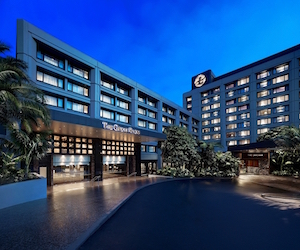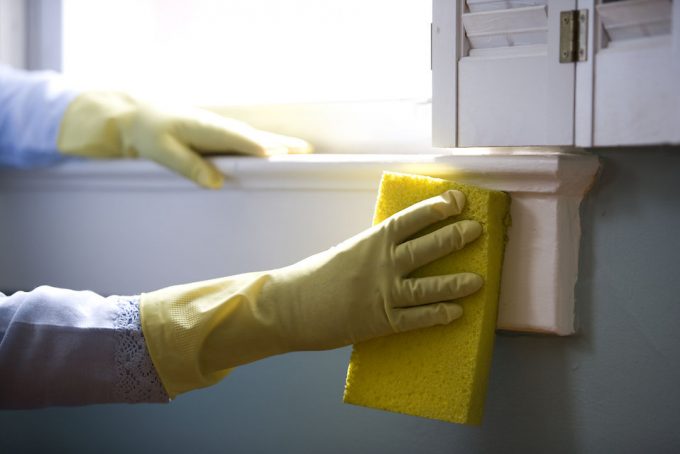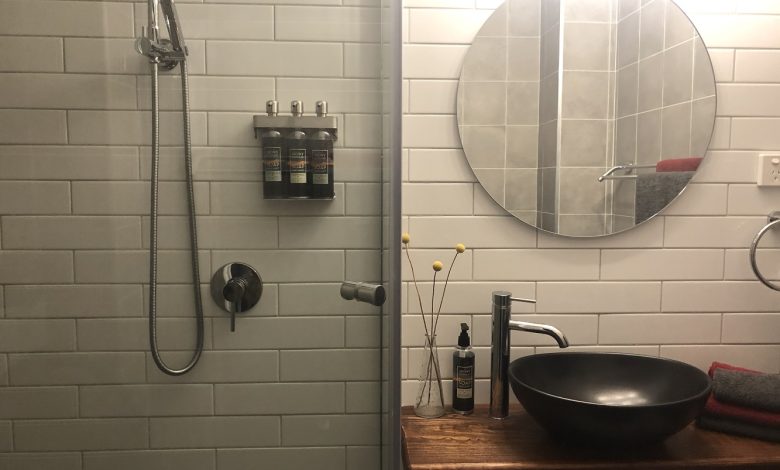
Dispensing with disposables: The rise of the dispenser
According to a recent study 90 percent of travellers look for sustainable options while on holiday and avoid a destination if the commitment to sustainable practices isn't real
As environmental concerns and guest expectations rise, accommodation owners and managers need to implement sustainable practices that don’t detract from the guest experience.
Our latest AccomNews print issue is available now. Read it HERE
According to a study by Hospitality Net, 90 percent of travellers look for sustainable options while on holiday. In fact, two in five respondents said they have avoided a travel destination or transportation option due to skepticism that the commitment to sustainable practices was real.
While traditionally hotel toiletries were provided in miniature, single-use bottles. This desire for a clear commitment to sustainability may mean it is time to consider alternate options.
Ecomenities director Claire Hanley said reducing waste was high on the agenda for the accommodation industry.
“Anyone who has stayed in a hotel will know that the industry is a waste juggernaut, but there has definitely been a shift in the last few years to more sustainable practices,” she said.
“For accommodation providers wanting to become more eco-friendly, it’s a good idea to look at the easy-to-introduce options first, things that won’t cost a lot, and can be implemented with no fuss.
“Plastic wrapped single-use and single-serve items are the most waste producing and the easiest to change.”
However, making the jump to a new system for toiletries can be daunting, especially as many recall the unsightly and clunky soap dispensers of years past.
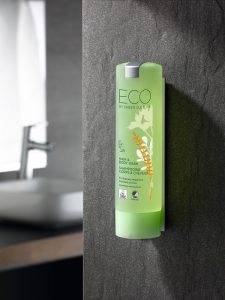
There is a move away from portion amenities to dispensers said Swisstrade Principal Peter Weingartner. He advised: “It’s wise to stay ahead of legislation, which is quickly banning plastic items from Australian hotel rooms. High on the hit-list is guest room accessories and rubber slippers, for which there are some very good alternatives available.”
On the move to dispensers, he said: “while they were once frowned upon, they are now considered the industry standard for their clear commitment to sustainability.
“The easiest and most cost-effective way to demonstrate environmental leadership is to transition from single-use plastic to products made from natural, renewable raw materials.”
Whether you’re a caravan park with a community feel or a luxe accommodation provider with all the bells and whistles, it can be difficult to know where and how to begin the journey to dispensers.
Christina Fedders, Founder, and Managing Director, Design Stuff Group said shifting from single use packaging can be implemented very easily by all.

She said: “Investing in refillable (plastic, metal or glass) bottles for hospitality venues and offices is not only a simple eco-friendly practice but can also elevate interior spaces, considering the range of brands and bottles available.”
Weighing up the costs
Ms Hanley said investing in quality was key.
“There is an initial upfront cost in getting bathrooms set up but when you choose high-quality options they should last for years,” she said.
“Ideally, set up costs should be repaid in reduced operating costs within 12 months.
“Look at how much you are spending currently on toiletries. If you are spending $1 per day, per room it’s a huge annual expense, so consider investing $150 in a quality dispenser that will be paid off in six months – your ongoing room costs will plummet.”
For Mr Weingartner, factory-sealed dispenser systems are the way to go.
“With high labour cost and a shortage of staff, refilling pump dispensers can turn out to be more costly than expected,” he said
“Contrary to that, the latest factory-sealed dispensers offer great cost-in-use savings, guaranteed hygiene and a fuss-free replenishment process while being fully recyclable.”
When it comes to cost, Mrs Fedders advised to consider product design.
She said: “Choose a soap dispenser holder that is made from durable and quality materials. In doing so, venues will not need to replace or repair their hardware. This plays a huge role in having a sustainable footprint and reduces the turnover of fittings and fixtures. The key is not only in selecting a product that translates aesthetically but is durable and can stand the test of time.
“Hospitality amenity dispensers also need to offer flexibility in the sense that they can hold more than just one product. To create a more sustainable and cost-friendly solution over time, I suggest finding products that reduce single-use waste, provide longevity through quality materials and focus on form and function.”
She said there has been a rise in the popularity of refillable products and “they can offer a decent cost saving”.
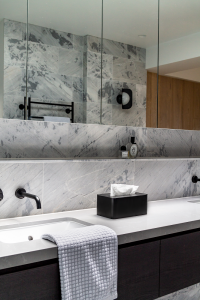
Consider your guests, and tailor to suit
Choosing the correct dispenser system and provider is a big consideration when choosing to ditch disposables!
For Ms Hanley, deciding on the best system is all about knowing your guests.
“Consider your target market and what their expectations are,” she said.
“Luxury high-end dispensers are now seen as a must for any business that cares about the environment.”
“And guests love to read what is in the bottle without reading glasses (a problem with mini soaps) so remember to have large labels!”
And if you’re committed to investing in a dispenser system, consider personalising it to suit your accommodation.
Some systems allow you to put your own brand or logo on the dispenser, or even create a bespoke fragrance for your toiletries!
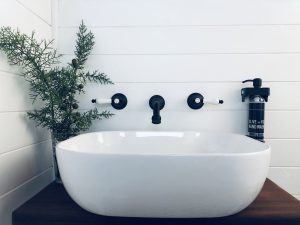
Mrs Fedders said: “Some hotels use their soap dispenser holders as a branding opportunity by producing their own bottle label for products sourced from local companies. In doing so, venues can create a true branded experience for their customers, simultaneously having the options to sell them on their own ecommerce platform.”
But are they hygienic?
With COVID-19 remaining a threat, the cleanliness of dispenser systems may pose a concern for accommodations considering the switch.
Mr Weingartner said that factory-sealed dispensers are shown to be very safe and the most hygienic solution.
He warned that with refillable systems, accommodation providers must closely adhere to manufacturers guidelines to ensure that hygiene is upheld and prevent contamination.
Ms Hanley said that with staff education and training refillable options are a safe and hygienic option.
“Cleaning dispensers is super easy,” she said, “and should just be part of the bathroom housekeeping routine, the same as the taps or door handles.”
Mrs Fedders agreed, she said the best practice for maintaining a high level of cleanliness is to wash the liquid containers regularly. She recommends “establishing a rotation of product bottles so that it allows a maintenance team to replace, clean, refill and repeat the process without needing to discard bottles regularly”.
She said: “When looking for liquid refills, it’s important to find an easy-to-pour method so that it reduces any spillage.”
And finally, all three experts agreed that moving your business to a more sustainable model needs to be holistic.
Mr Weingartner said: “There are many opportunities to showcase sustainability in a guest room. From slippers made from flax linen to plastic free dry amenities and Fair-Trade certified tea and coffee.
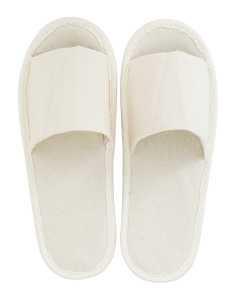
“Since all these elements are highly visible, guests immediately appreciate the operator’s commitment to sustainability without it costing the earth.”
Mrs Fedders said the sustainability concept should be adapted to other kinds of amenities such as tissue dispensers, toilet roll dispensers, sanitiser dispensers and cotton pads storage and dispensers.
“When making a choice about which amenity dispensers are going to be worthwhile, it’s essential to consider your guest’s experience.”
Ms Hanley added: “It’s super easy to reduce plastic waste, and often just a case of changing the way things are done,”
“First look at where the waste is being generated. Then sit down with the associated staff and work out a way to remove plastic waste from the areas where they work.
“And don’t worry too much about what guests will think about change. Many are glad to see the back of individually wrapped items. No one has ever not booked a hotel because they serve breakfast jam in a bowl rather than a single-serve plastic packet!”
Sarah is a freelance journalist with experience across print, digital and audio. After working for Multimedia Publishing as a contributing writer, she has recently joined the team in a part-time capacity for School News AU and AccomNews.



